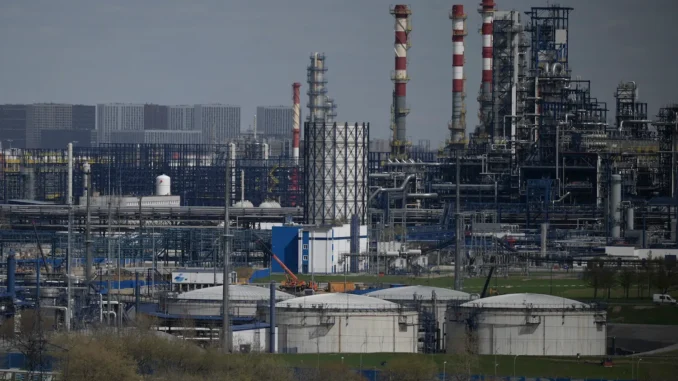
Kyiv aims to do with explosives what two years of Western sanctions haven’t yet managed.
In recent weeks, Ukraine has found a way to overcome a lack of aid and a dearth of ammunition, using long-range drones to strike oil industry assets deep inside Russia. The attacks on Russian oil refineries—which number at least a dozen so far, including some very long-range strikes—have damaged Russia’s ability to process and refine its huge output of crude oil, dealing a small but meaningful blow to a Russian energy sector that has so far weathered the war and Western sanctions in surprisingly good shape.
The campaign, which has been tacitly acknowledged by Ukrainian security services and officials, is meant to strike at both the economic and logistic sinews of Russia’s war effort, which is still grinding its way through the third year of its invasion of Ukraine. (Ukrainian drones have also targeted Russian defense production plants.)
“These attacks are on a major source for the Russian budget, and that budget is being spent on military equipment,” said James Henderson, an expert on the Russian energy sector at the Oxford Institute for Energy Studies.
Moscow gets about 40 percent of its federal budget from the export of crude oil and refined products (and that share is even bigger when converted into Russian rubles), making the sector a key part of the Kremlin’s ability to increase defense spending, rebuild its shattered armies, and purchase huge amounts of foreign-made weaponry to use against Ukraine. Russian refineries also churn out millions of barrels a day of products such as diesel and aviation fuel, which are needed for Russia’s perpetually logistics-constrained armed forces.
The Ukrainian strikes so far, which have damaged numerous refineries and started several fires, have knocked out anywhere between 400,000 and 900,000 barrels a day of refining capacity, according to estimates from energy experts and defense officials. Russia has an installed refining capacity—not all of which it uses—of about 6 million barrels a day, and refineries processing more than 2 million barrels a day have been targeted by Ukrainian strikes, some that did superficial damage and some that did more, in recent months.
While the impact of the Ukrainian attacks has varied from refinery to refinery, they present two big problems for Moscow. First, the continued attacks will further stretch Russia’s limited air defenses across even farther-flung bits of its sprawling territory. Second, due to years of Western sanctions, repairs to more advanced refinery components could be much trickier than in normal circumstances, which could affect Russia’s ability to churn out higher-value petroleum products, such as high-octane fuels.
“The higher-quality products are the ones that are going to be at higher risk,” Henderson said.
The Ukrainian onslaught has consequences that reach beyond the Kremlin. Moscow has retaliated with its own bombing campaign, a reprise of previous years’ efforts to destroy Ukraine’s energy infrastructure. Russian missiles struck power supply facilities all over Ukraine last week in what appeared to be the biggest attack yet on Ukraine’s ability to keep the lights on. That’s especially problematic since Ukraine is running low on air defense ammunition needed to protect large cities and power plants, and the big U.S. aid package remains captive in the Republican-controlled House of Representatives.
The strikes are also rippling into trading rooms in New York and London. Global oil prices have stayed above $80 a barrel over concerns of an escalation of Ukrainian attacks that could inflict further damage on one of the world’s biggest oil producers and exporters. That’s one reason why the Biden administration, facing a fall election, seems nervous about the Ukrainian drone campaign.
U.S. officials reportedly asked Ukraine to limit strikes on Russian oil facilities that could lead to higher prices, though Kyiv has made clear that its campaign will continue. Unlike U.S.-delivered long-range weapons, the drones used for the oil industry assaults are Ukrainian and don’t carry Western restrictions. A White House spokesperson declined to comment directly on reports that it asked Ukraine to abstain from such attacks, but White House national security spokesperson John Kirby reiterated that “we do not encourage or enable the Ukrainian military to conduct strikes inside Russia.”
Since the start of the war, the Biden administration has been leery of squeezing Russia’s energy golden goose too hard, lest it spike global energy prices. The embargo on Russian oil exports was only gradually phased in, and a price cap on Russian crude meant to limit Moscow’s energy earnings has proved disappointing.
What’s more, until recently, Russia was able to use a fleet of shadow oil tankers—vessels that circumvent normal shipping rules such as insurance and identification—to bypass Western restrictions on shipping its crude by sea. All of that has meant that the prewar level of Russian oil exports has been basically unaffected by sanctions and embargoes. But a growing crackdown on shadow tankers, coupled with further Ukrainian strikes, could make for a tighter oil market in months to come, said ClearView Energy Partners, an energy consultancy.
But that’s not Ukraine’s concern. Rather, Kyiv figures that if Russia has trouble processing its crude, it may be forced to pump less. Indeed, Russia this week announced that it will cut oil output to comply with informal production quotas agreed with OPEC+; some energy experts believe Moscow has little choice given the carnage in its downstream facilities.
But there’s another risk, Henderson warned. Just as the United States and other Western countries have gotten more rigorous at cracking down on Russia’s evasion of oil export bans, Moscow may have an incentive to just export more of its unrefined crude. If it does so, it will mean a return to steep discounts on Russian oil as compared with global benchmarks, which will give shippers and third countries reason to get creative yet again at sidestepping sanctions.



